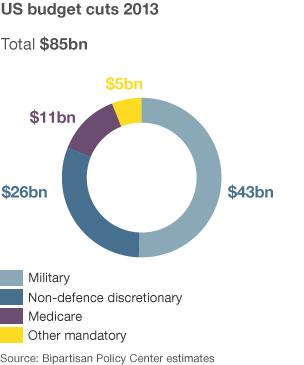White House meeting ends with no deal on budget cuts
- Published
US President Barack Obama: "Washington didn't make it easy at a time when businesses have began to get some traction"
US political leaders have left last-ditch talks at the White House without a deal to avoid steep budget cuts.
President Barack Obama blamed Republicans' refusal to allow any tax rises for the negotiations' failure, calling the sweeping $85bn (£56bn) in cuts "unnecessary" and "inexcusable".
With Congress adjourned for the weekend, the cuts are due to be written into the budget by the end of Friday.
The IMF has warned the cuts could slow global economic growth.
Analysis in the US, external suggests the nation's economic output, or Gross Domestic Product (GDP), could grow by just 1.4% in 2013 unless the cuts are delayed or replaced. US GDP grew by 2.2%, external in 2012.
Mr Obama warned the economy would suffer because of the failure to reach a deal.
"We shouldn't be making a series of dumb, arbitrary cuts to things that businesses depend on and workers depend on," he said after Friday's meeting.
"Not everyone will feel the pain of these cuts right away. The pain, though, will be real."
The president attacked congressional Republicans for "refusing to budge" on closing any tax loopholes, arguing they were protecting tax breaks for the "well-off and well-connected".
Mr Obama said he believed a sufficient number of lawmakers were willing to make a deal, even if their leaders were not.
"There's a caucus of common sense," he said. "It's just a silent group right now."

'Spending problem'
Republican House Speaker John Boehner, meanwhile, reiterated his party's refusal to allow taxes to rise and challenged the gridlocked US Senate to pass a bill first before the House acted on a plan.
"The American people know that Washington has a spending problem," Mr Boehner said as he left the White House on Friday.
"Let's make it clear that the president got his tax hikes on 1 January. The discussion about revenue, in my view, is over. It's about taking on the spending problem."
The BBC's Mark Mardell in Washington says the cuts are meant to hurt, as they were designed two years ago to be so brutally painful that politicians would be forced to agree on a better way of balancing the books.
The cuts are split roughly evenly between military and domestic programmes, but effects will be felt over time rather than immediately.
Budget bills from both parties were defeated in the Senate on Thursday.
A Democratic plan proposing nearly $30bn in future cuts in defence spending and a minimum tax rate on incomes exceeding $1m was blocked by Republicans on Thursday.
The cuts are scheduled to be signed into the federal budget by President Obama by 23:59 local time on Friday (04:59 GMT on Saturday).
But now attention will also turn to the next congressional challenge - a possible shutdown of the US government if no funding bill is passed in the next month.
On 27 March a temporary federal budget that has kept the federal government running since 2012 is due to expire.
House Republicans have said they will vote on a bill next week to fund the government through the end of the fiscal year, on 30 September, but keep in place some automatic cuts taking effect on Friday.
- Published1 March 2013
- Published28 February 2013
- Published26 February 2013
- Published1 March 2013